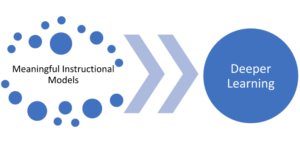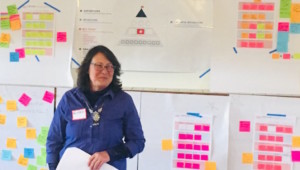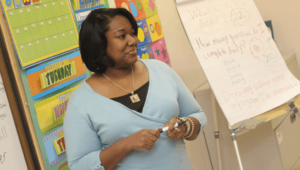Deeper Leading

By Jim May
I recently had the opportunity to attend the first ever Deeper Learning conference in San Diego, CA. Educators from around the country convened to discuss deeper learning and the successes and challenges they have encountered in their efforts to precipitate it. Deeper Learning is an effort sponsored by the Hewlett Foundation to prepare students for a world that has changed and continues to change radically. In short, Deeper Learning prepares students to:
- Master core academic content
- Think critically and solve complex problems
- Work collaboratively
- Communicate effectively
- Learn how to learn (e.g., self-directed learning)
Deeper Learning represents the evolution of a conversation that has gone on for some time now. The primary thrust of that conversation is that the pre-eminent challenge facing our schools is not one of student achievement on standardized assessments but rather a fundamental misalignment between school and the realities of our modern economic and civic life. Deeper Learning represents an attempt to better align the experiences that students have in school with the demands that will be made of them by the world.
While much has been made of this argument and its implications for instruction and student learning (e.g., the 21st Century Skills movement), considerably less attention (at least in the popular discourse) has been given to the ramifications these ideas hold for adult learning in schools. I want to draw our attention to the adult side of this equation for a moment. In particular, I want to devote some thought to the implications this argument has for the exercise of leadership if we are to create schools where students regularly engage in deeper learning.
What is learning?
That may seem like a dumb question, but I have been assured by generations of teachers that such things do not exist. It is important to note that the definition of deeper learning (the bullet points above) points to a changed definition learning. As Elmore, City & Lynch note, in the world of schools learning has historically meant “the accumulation of authoritative knowledge.” We did well in school by memorizing historical facts, scientific information, and mathematical formulas and giving it back to our teachers in a minimally altered fashion on quizzes, tests, papers, lab experiments, etc. However, the well documented reality that the volume of information available to us has grown exponentially and that access to it has been radically democratized through a variety of portals necessitates a revised definition of learning. Thus, “…learning becomes mastering the ways of imputing meaning to information – not recall and application of official knowledge.” [i]
Who needs to learn?
Believers in deeper learning and 21st century skills have worked tirelessly to reimagine what teaching and learning looks like for students. However, the energy devoted to a similar shift in the way we think about and organize adult learning in schools has been inadequate to date. Generally speaking, schools approach adult learning and professional development through the lens of training. We have a meeting where we say something like, “Today you will be trained on how to create authentic learning experiences” (that statement is problematic in and of itself). Next, we go to the classrooms and look to see if teachers are doing exactly what they were told to do in the training. In short, we are doing to our teachers what we have historically done to our students – test them on their ability to mimic or reproduce what someone else decided was important.
If we want students to experience deeper learning then we have to structure the work of teachers to reflect those same principles. That means we have to shift our mindset with regard to adults from training to learning (our revised definition of learning that is). The work of teachers must necessarily be organized around thinking critically about and solving the complex problems that emerge in relationship to teaching, learning, and school improvement. Teachers must be able to transform all of the information (anecdotal observations, student work, assessment data, etc.) they encounter into insight, and subsequently turn that insight into action. The work has to be done collaboratively because the volume of information is too large and the challenges often too complex to tackle in isolation. Teachers need access to and proficiency with modern technology that enables learning and collaboration in order to do this work well. In short, the most relevant skill to being good at teaching is to be good at learning, specifically deeper learning. These are the skills we need to be cultivating among our teaching corps as we think about professional development and adult learning.
The Work of Leadership
What does this mean for the work of leadership in general and the role of the principal in particular? Historically, school was the place where knowledge that was created and deemed important elsewhere came for distribution to the masses. The responsibility of the student was simply to memorize that body of knowledge as completely as possible. However, if we hope to create schools where students regularly engage in deeper learning then they have to become places capable of generating knowledge, not just disseminating it.
Deeper learning is about something much…well…deeper. Deeper learning is about preparing students for a reality where there are no answers in the back of the book. Deeper learning is about facing the reality that memorizing a tiny sliver of the information available to humans will not equip students to engage the world productively. Deeper learning is about what you do when all the experts in a field disagree about the answer to a problem. Deeper learning is about having the tools to transform an ever-expanding stream of information into meaning that can be applied to future experiences, individually and collectively.
Thus, the central function of school leadership is to organize the entire school around learning. That means structuring the daily work of teachers and administrators (not just the professional development time) so that it reflects the principles of deeper learning. School leaders have an important role to play in leading us towards deeper learning in that they are well positioned to wield extreme influence over the daily life of the adults. To organize your school around learning sounds obvious, but it amounts to a seismic shift in the practice of most schools. To do this well requires reimaging every conversation, every practice, and every structure (not just the ones for students) to prioritize learning – not accountability. Deeper leading begins with leaders taking responsibility for the deeper learning of adults.
Jim May is a School Development Coach with the New Tech Network, a national network of project-based, K-12 public schools. A former teacher and principal, Jim’s work focuses on leadership development across the 120+ schools that comprise the New Tech Network.




Tony Balsama
Can you elaborate by providing examples how leaders actually change the school environment throughout the day for deeper learning?
Christie McMaster
This was an interest ing article. We want all students to incorporate deeper learning in all that they do.
Chloe hunt
I do agree that we should be looking at not only changing the ways in which we as educators interact and guide our students, but also how the education community interacts and guides all staff involved in our learning/changing communities.
Michelle Oyao
Shift the emphasis from assessment to learning.
Adults and students need to both be on a track to learn deeper.
Tycene Edd
Deeper learning is key to complex problem solving. The key is skill-building in inquiry.
Christy Nickerson
This article was powerful and caused me to re-image my ideals about the type of leadership needed to bring about change! Thanks Jim!